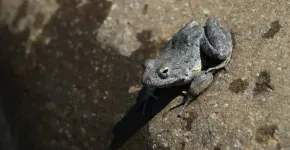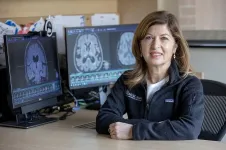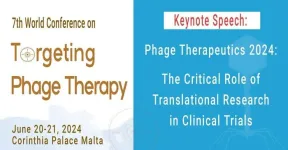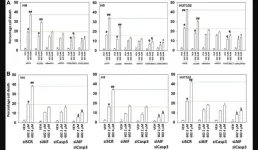(Press-News.org) Chestnut Hill, Mass (2/26/2024) – Boston College Assistant Professor of Biology Emrah Altindis has been awarded a five-year, $2.5-million grant from the National Institutes of Health to study viral insulins and mechanisms related to IGF-1 receptor protein inhibition and its potential applications in cancer treatment.
Altindis said he and the researchers in his lab will use the grant to learn more about how to use specific viral insulins – particularly insulin-like growth factor-1 (IGF-1) – to inhibit IGF-1 receptor action, which is increased in a range of diseases, including human cancers.
“I am very excited about our viral insulin project and grateful to the National Institutes of Health for this essential support as we move forward,” Altindis said. “We have made some important discoveries related to unique functions of these viral insulins that are pointing us in the right direction to develop novel therapeutics to inhibit an important receptor and, ultimately, improve human health.”
The Altindis lab has discovered that six viruses mimic human insulin and IGF-1 and have special peptides, which his team named: viral insulin/IGF-like peptides (VILPs).
Their research is focused on learning more about how these viral insulins work. Importantly, the lab’s experiments have discovered that only two of these VILPs can uniquely block an important receptor called insulin-like growth factor receptor (IGF1-R), which is overly active in different diseases including breast, ovarian and prostate cancers, Altindis said.
Scientists have been searching for ways to inhibit this receptor for the past three decades, but have yet to meet with success. With the NIH award, from the agency’s National Institute of Diabetes and Digestive and Kidney Diseases, Altindis and his team are trying to more precisely determine how VILPs can block the IGF1 receptor.
Learning that could lead to affordable and specific treatments that inhibit the receptor for a range of diseases.
Viruses are known to mimic the host’s immune system proteins to manipulate the host during infection. However, Altindis Lab’s discovery identified another mimicry mechanism. In the case of these viral insulins, viruses mimic two important human hormones, insulin and IGF-1 and act through insulin receptor and IGF-1 receptor. Insulin regulates cell metabolism, and impairment of insulin receptor signaling causes insulin resistance and type 2 diabetes. The IGF-1 receptor stimulates proliferation and cell growth, and any impairment is related to growth disorders and uncontrolled proliferation.
“In the last six years, we have shown that these VILPs can bind and activate the human insulin receptor and IGF-1 receptor,” Altinidis said. “Unlike others, two of the VILPs we identified have a unique function: binding and specifically inhibiting the IGF-1 receptor without affecting insulin receptor function."
Insulin receptors and IGF-1 receptors are very similar in their structure. Therefore, the challenge for Altindis and his fellow scientists has been trying to stop the cell proliferation triggered by IGF-1 by inhibiting IGF-1 receptors without affecting insulin receptor signaling.
Using laboratory models, the Altindis lab will investigate how VILPs interact with IGF1R using advanced techniques, including CryoEM imaging and TurboID labeling. In addition, they will use phosphoproteomics to understand the unique signaling events stimulated by the VILPs.
Additionally, experiments will explore the effects of VILPs on IGF-1 signaling and growth in different tissues. Finally, Altindis said the team should be able to determine the effects of these VILPs on cancer cell proliferation in the lab focusing on breast cancer and in related mouse models.
“To our knowledge, VILPs represent the first potent and specific peptide inhibitors of the IGF-1 receptor,” Altindis said. “In this project, our focus is to understand their mechanism of action. Addressing this question will guide us in developing even more effective inhibitors of the receptor.”
Altindis said there is an urgent need to develop potent, specific and affordable IGF-1 receptor inhibitors to treat IGF1R-related cancers and other diseases like Grave’s disease. Ideally, these inhibitors could be used in combination with other therapies to treat cancer in humans. He believes the project has the potential to impact both the basic understanding of the IGF-1 receptor action as well as lead to the development of novel treatment approaches for breast cancer.
“The challenge lies in translating these findings into practical treatments for diseases,” Altindis said. “This study lays the foundation for future research and clinical developments in the field of IGF-1-related disorders. We hope to generate significant new insights into our understanding of IGF-1 signaling and inhibition that will eventually lead to the design of inhibitors that can be used to treat human disease.”
END
Boston College biologist awarded $2.5-million NIH grant to explore the role of viral insulins and potential applications to cancers
Assistant Professor of Biology Emrah Altindis is studying the mechanisms of viral insulins – which mimic human insulin – in order to develop novel therapeutics that can be used in a range of human diseases
2024-02-26
ELSE PRESS RELEASES FROM THIS DATE:
New clinical practice guideline provides evidence-based recommendations for immunotherapy for inhalant allergy
2024-02-26
ALEXANDRIA, VA —The American Academy of Otolaryngology–Head and Neck Surgery Foundation published the Clinical Practice Guideline: Immunotherapy for Inhalant Allergy today in Otolaryngology–Head and Neck Surgery. This clinical practice guideline identifies quality improvement opportunities and provides clinicians trustworthy, evidence-based recommendations on the management of inhalant allergies with immunotherapy, supporting them to provide enhanced care to patients aged 5 years and older who are experiencing symptoms from inhalant allergies.
“More ...
SFU-led research team designs a cutting-edge protein lawnmower
2024-02-26
An SFU-led collaboration has designed the first synthetic protein-based motor which harnesses biological reactions to fuel and propel itself.
“Imagine if a Roomba could be powered only by the dirt it picks up,” says SFU Physics professor Nancy Forde, one of the authors of the study.
The team’s paper, led by SFU Physics PhD graduate Chapin Korosec and published today in Nature Communications, describes a protein-based molecular motor called “The Lawnmower,” which has been designed to cut a lawn of peptide “grass.” ...
Metal in glitter impairs aquatic plant growth, study shows
2024-02-26
Glitter is used in a wide array of colors and shapes in apparel, footwear, cosmetics, makeup, handbags, festive decorations, arts and crafts, and jewelry, among many other applications. During the Carnival holidays, hundreds of thousands of Brazilians cover parts of their bodies with it while dancing in the streets. Its brilliance is dazzling but it is considered an emerging pollutant by many scientists: like other microplastics (small plastic pieces less than 5 mm long), it is not filtered by wastewater treatment plants and ends up in rivers and the sea, interfering with aquatic life in various ways.
A study conducted at the Federal University of ...
Scientists assemble a richer picture of the plight and resilience of the foothill yellow-legged frog
2024-02-26
(Santa Barbara, Calif.) — Up to only a few inches in length, with a lemon-hued belly, the foothill yellow-legged frog may seem unassuming. But its range once stretched from central Oregon to Baja California. In 2023, it was listed under the federal Endangered Species Act. Its rapidly decreasing range is due in part to a fungal pathogen called Batrachochytrium dendrobatidis, or Bd, that has devastated amphibians around the world.
A team of researchers, including UC Santa Barbara’s Andrea Adams, has conducted the most comprehensive study to date ...
Neuropsychiatric symptoms predict which patients with mild cognitive impairment develop Alzheimer’s disease.
2024-02-26
As the years add up, it's common to notice slight changes in our ability to remember and think. Older people who have more marked changes than their peers can be diagnosed with mild cognitive impairment (MCI). Currently, we can’t easily predict which of these patients will develop Alzheimer’s disease and which will not.
“It's hard to predict which patients will have a more rapid progression and receive a diagnosis of dementia,” said Maria Vittoria Spampinato, M.D., division director of Neuroradiology at the Medical University of South Carolina.
“It’s important ...
Resurrecting niobium for quantum science
2024-02-26
For years, niobium was considered an underperformer when it came to superconducting qubits. Now scientists supported by Q-NEXT have found a way to engineer a high-performing niobium-based qubit and so take advantage of niobium’s superior qualities.
When it comes to quantum technology, niobium is making a comeback.
For the past 15 years, niobium has been sitting on the bench after experiencing a few mediocre at-bats as a core qubit material.
Qubits are the fundamental components of quantum devices. One qubit type relies on superconductivity to process information.
Touted for its superior qualities as a superconductor, niobium was always a promising ...
Long-term data reveals SARS-CoV-2 infection and vaccine-induced antibody responses are long-lasting
2024-02-26
A long-term analysis conducted by leading microbiologists at the Icahn School of Medicine at Mount Sinai reveals that antibody responses induced by COVID-19 vaccines are long-lasting. The study results, published online in the journal Immunity on February 22, challenge the idea that mRNA-based vaccine immunity wanes quickly.
The emergence of SARS-CoV-2, the virus that causes COVID-19, in late 2019 sparked the global pandemic that is now in its fifth year. Vaccines that were developed at record speed have saved millions of lives. However, the emergence of SARS-CoV-2 variants and waning immunity have decreased ...
Shaping the future of phage therapy: The 7th World Conference on Targeting Phage Therapy in Malta aims to transform clinical trials through translational research
2024-02-26
The 7th World Conference on Targeting Phage Therapy 2024, two-day event dedicated to advancing the field of phage research and therapy will be hosted at Corinthia Palace Malta on June 20-21.
Robert T. Schooley, M.D., Professor of Medicine at the University of California, San Diego, Co-Director of the Center for Innovative Phage Applications and Therapeutics, and member of the Executive Committee for the University of California Disaster Resilience Network, will introduce the messages and strategies behind phages therapy 2024.
His talk titled “Phage Therapeutics 2024: Essential Translational Research Components for ...
GZ17-6.02 with bexarotene kills mycosis fungoides cells
2024-02-26
“The present studies were performed to extend our knowledge of GZ17-6.02 biology from that known in solid tumor cell types such as prostate cancer cells to liquid tumor cell types, for example, mycosis fungoides.”
BUFFALO, NY- February 26, 2024 – A new research paper was published in Oncotarget's Volume 15 on February 8, 2024, entitled, “GZ17-6.02 interacts with bexarotene to kill mycosis fungoides cells.”
In this new study, researchers Michael R. Booth, Laurence Booth, Jane L. Roberts, Cameron West, and Paul Dent from Virginia Commonwealth University and Genzada Pharmaceuticals investigated the therapeutic agent GZ17-6.02, composed of curcumin, ...
University of Tennessee Health Science Center professor awarded $1.5m to study 'root causes' of disparity in breast cancer survival of Black women and white women
2024-02-26
Memphis, Tenn. (February 26, 2024) – Shelley White-Means, PhD, a professor of Health Economics in the Department of Interprofessional Education and the director of the Consortium for Health Education, Economic Empowerment and Research (CHEER) at UT Health Science Center, recently received a $1.5 million, four-year grant from the National Institute on Minority Health and Health Disparities to explore the root causes of the disparity in breast cancer survival of Black women compared to white women.
Dr. White-Means and a team will look beyond the social determinants of health to explore what she terms “the intersectionality of race, ...
LAST 30 PRESS RELEASES:
ASU researchers showcase scalable tech solutions for older adults living alone with cognitive decline at AAAS 2026
Scientists identify smooth regional trends in fruit fly survival strategies
Antipathy toward snakes? Your parents likely talked you into that at an early age
Sylvester Cancer Tip Sheet for Feb. 2026
Online exposure to medical misinformation concentrated among older adults
Telehealth improves access to genetic services for adult survivors of childhood cancers
Outdated mortality benchmarks risk missing early signs of famine and delay recognizing mass starvation
Newly discovered bacterium converts carbon dioxide into chemicals using electricity
Flipping and reversing mini-proteins could improve disease treatment
Scientists reveal major hidden source of atmospheric nitrogen pollution in fragile lake basin
Biochar emerges as a powerful tool for soil carbon neutrality and climate mitigation
Tiny cell messengers show big promise for safer protein and gene delivery
AMS releases statement regarding the decision to rescind EPA’s 2009 Endangerment Finding
Parents’ alcohol and drug use influences their children’s consumption, research shows
Modular assembly of chiral nitrogen-bridged rings achieved by palladium-catalyzed diastereoselective and enantioselective cascade cyclization reactions
Promoting civic engagement
AMS Science Preview: Hurricane slowdown, school snow days
Deforestation in the Amazon raises the surface temperature by 3 °C during the dry season
Model more accurately maps the impact of frost on corn crops
How did humans develop sharp vision? Lab-grown retinas show likely answer
Sour grapes? Taste, experience of sour foods depends on individual consumer
At AAAS, professor Krystal Tsosie argues the future of science must be Indigenous-led
From the lab to the living room: Decoding Parkinson’s patients movements in the real world
Research advances in porous materials, as highlighted in the 2025 Nobel Prize in Chemistry
Sally C. Morton, executive vice president of ASU Knowledge Enterprise, presents a bold and practical framework for moving research from discovery to real-world impact
Biochemical parameters in patients with diabetic nephropathy versus individuals with diabetes alone, non-diabetic nephropathy, and healthy controls
Muscular strength and mortality in women ages 63 to 99
Adolescent and young adult requests for medication abortion through online telemedicine
Researchers want a better whiff of plant-based proteins
Pioneering a new generation of lithium battery cathode materials
[Press-News.org] Boston College biologist awarded $2.5-million NIH grant to explore the role of viral insulins and potential applications to cancersAssistant Professor of Biology Emrah Altindis is studying the mechanisms of viral insulins – which mimic human insulin – in order to develop novel therapeutics that can be used in a range of human diseases








